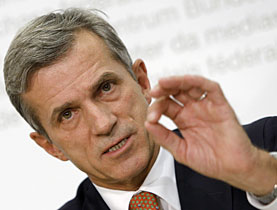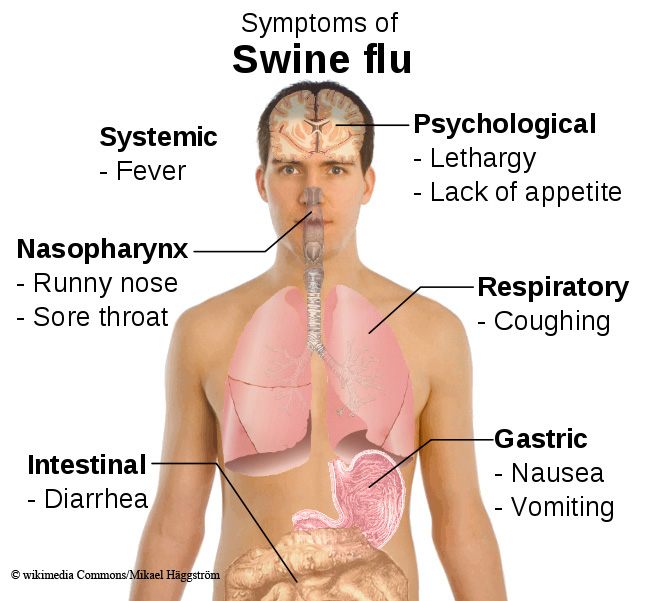
Swiss left unimpressed by swine flu policy

Government calls for at-risk individuals to get vaccinated against H1N1 have fallen largely on deaf Swiss ears, with many believing the threat is exaggerated.
A doctor in Bern told swissinfo.ch that the Federal Health Office’s policy was “catastrophic”, and at a drop-in centre for children not one parent could be found who intended to vaccinate either themselves or their children.
“Definitely not,” one mother replied. “For me the side effects of the vaccination haven’t been scrutinised and I’ve heard of people who are allergic to the egg white going into shock.”
In vaccine production, versions of the virus are injected into the embryos of chicken eggs which are then incubated for several months. The egg whites are then extracted and blended into a vaccine.
Pharmaceutical giant Novartis says it has received regulatory approval in Germany for a new swine flu vaccine made using cell cultures instead of egg-based methods. It is now pursuing registration of the vaccine in Switzerland.
“I think it’s crazy how it’s been built up by the media when there are many other diseases that are treated like taboos despite being in my opinion much worse, such as hepatitis. No one talks about them,” the mother went on.
She said she didn’t know anyone who was going to vaccinate their children – “simply because the vaccine hasn’t been thoroughly tested. We also have pregnant women here but none is going to get vaccinated because you don’t know what it could do to the baby.”
Although the government recommends it? “But the government also doesn’t know. The vaccination hasn’t been tested effectively. We don’t know how people are going to react. It’s like a manipulation for money and power whenever a new vaccine comes onto the market – and that bothers me.”
National distrust
A distrust of Big Pharma featured in all the mothers’ responses.
“A fact that stands out for me – and one that’s left a bitter taste – is that the government is working so closely with Daniel Vasella [CEO of Novartis],” said another parent.
“That for me discredits the issue of vaccinating. And I think Vasella’s bonus is high enough [last year his salary plus benefits totalled SFr40.3 million ($40 million)].”
This mother also wasn’t going to vaccinate her child. “I asked the paediatrician and she didn’t think it was necessary for healthy children. To a large extent I think it’s scaremongering.”
A third mother said she was also “fundamentally against vaccines for normal flu”.
These views reflect the national mood. A recent poll for the SonntagsBlick newspaper found that almost nine out of ten respondents didn’t want to get vaccinated. A similar number said they didn’t vaccinate themselves against seasonal flu and just under half said they got a jab when travelling to distant countries.
Almost 60 per cent thought the government had exaggerated its swine flu warnings.
No deaths yet
Jacques de Haller of the Swiss Medical Association has admitted that awareness work is necessary.
But the deaths from swine flu around the world were very real, he said, pointing out that more than 1,000 people had died in the United States, several hundred in Britain and that the wave would reach Europe soon.
Switzerland has recorded more than 1,550 confirmed cases, including 30 patients who had to be admitted to hospital. But so far there have been no deaths – something that Thomas Zeltner, head of the Federal Health Office, on Monday said was “pretty astonishing”.
De Haller repeated the official line that it was crucial for the chronically ill, pregnant women, children with prior health problems from sixth months and health staff to get vaccinated against swine flu.

More
Pandemic
Swiss disadvantage
On Monday Zeltner was forced to defend the national immunisation plan, saying there was no chaos and that the programme was on schedule, with immunisation set to start in most cantons in mid-November.
He was responding to criticism in the media and among some doctors that the national plan was uncoordinated. There have also been concerns that it had taken too long for the authorities to approve the two vaccines that would be used.
But in an interview with the Tages-Anzeiger newspaper on Tuesday he admitted that Switzerland was “disadvantaged” by its “complex” health system, in which the country’s 26 cantons have autonomy over health issues.
Also on Tuesday Samuel Steiner, the head pharmacist for canton Bern, had harsh words for the “lack of thought” given to the vaccine distribution plan.
He said the vaccine – which after preparation can only be kept for 24 hours – was
being packaged in “much too big” units of 500.
The fear was that doctors would be forced to throw away vaccine that had expired.
“Catastrophic”
“I’ll have to get adults in cohorts of ten and vaccinate them quickly,” a paediatrician in Bern told swissinfo.ch on Tuesday, describing the government’s policy as “catastrophic”.
On Tuesday evening it was reported that distribution centres across the country were repackaging the vaccine in smaller units, to avoid waste.
“We’re lucky that this swine flu seems to be so mild so that they can improve their preparations,” said the doctor. I get all my information from the television! I have practically no direct information as a doctor – swine flu has now been in the southern hemisphere for months and we have no medical data about what really happened,” he said.
“They were unprepared for a pandemic situation.”
Thomas Stephens, swissinfo.ch
Switzerland has ordered 13 million doses of H1N1 flu vaccine from Novartis and GlaxoSmithKline.
Both vaccines contain an adjuvant called squalene, a natural organic oil which promotes good antibodies.
According to Novartis and GlaxoSmithKline, side-effects are similar to those of seasonal flu vaccines: a swelling and redness at the injection site and fever, limb pain and headache.
This swine flu variation, termed H1N1, is an influenza A virus spread from person to person.
It contains DNA from avian, swine and human viruses. Although swine flu viruses normally infect only pigs, they do sometimes cross the species barrier to cause disease in humans, according to the WHO.
It is passed from human to human by sneezing, coughing or by hand contact. The WHO says swine flu is not transmitted to people eating properly handled and prepared pork or other products derived from pigs.
New flu strains can spread fast because no-one has natural immunity and a vaccine can take months to develop.


In compliance with the JTI standards
More: SWI swissinfo.ch certified by the Journalism Trust Initiative

















![The four-metre-long painting "Sonntag der Bergbauern" [Sunday of the Mountain Farmers, 1923-24/26] had to be removed by a crane from the German Chancellery in Berlin for the exhibition in Bern.](https://www.swissinfo.ch/content/wp-content/uploads/sites/13/2025/12/01_Pressebild_KirchnerxKirchner.jpg?ver=a45b19f3)












You can find an overview of ongoing debates with our journalists here . Please join us!
If you want to start a conversation about a topic raised in this article or want to report factual errors, email us at english@swissinfo.ch.